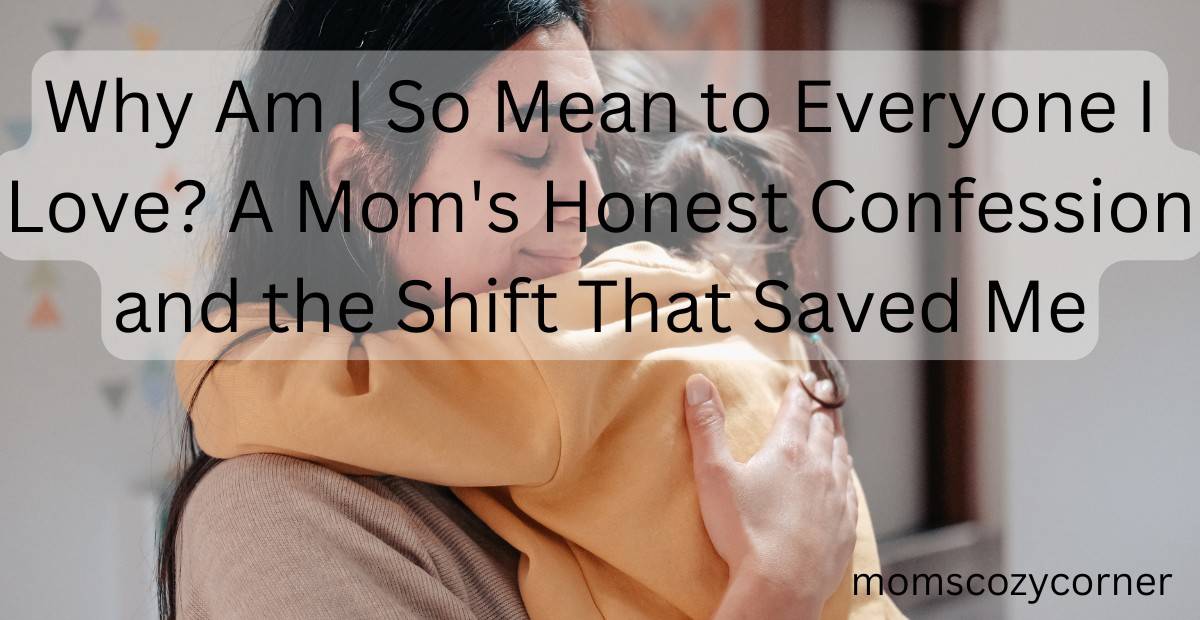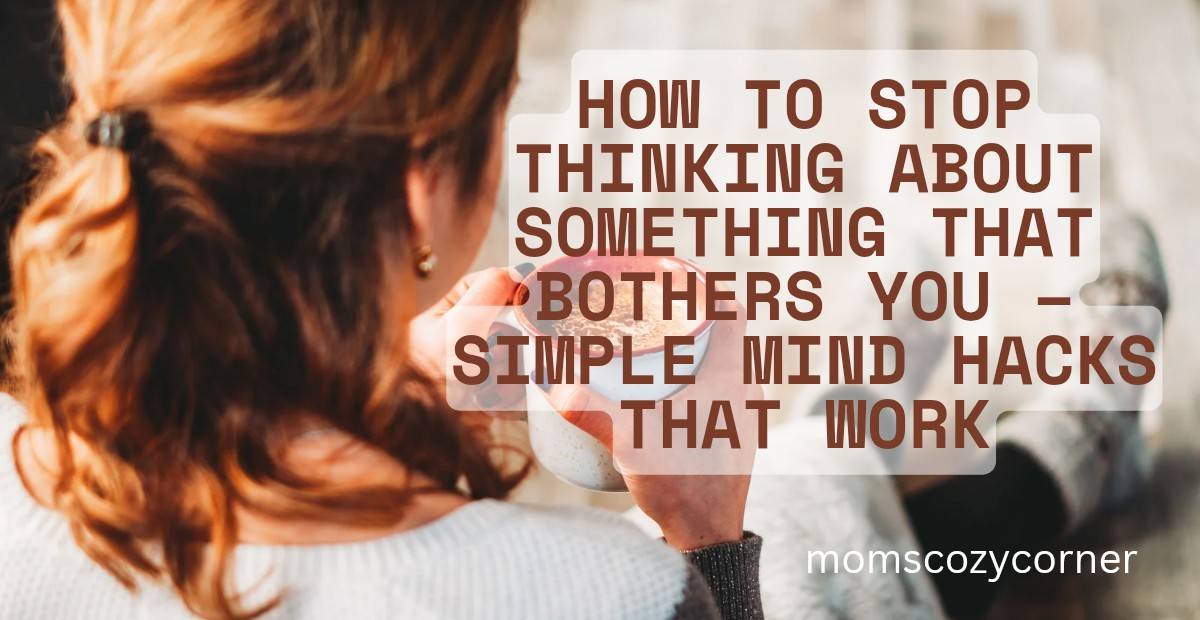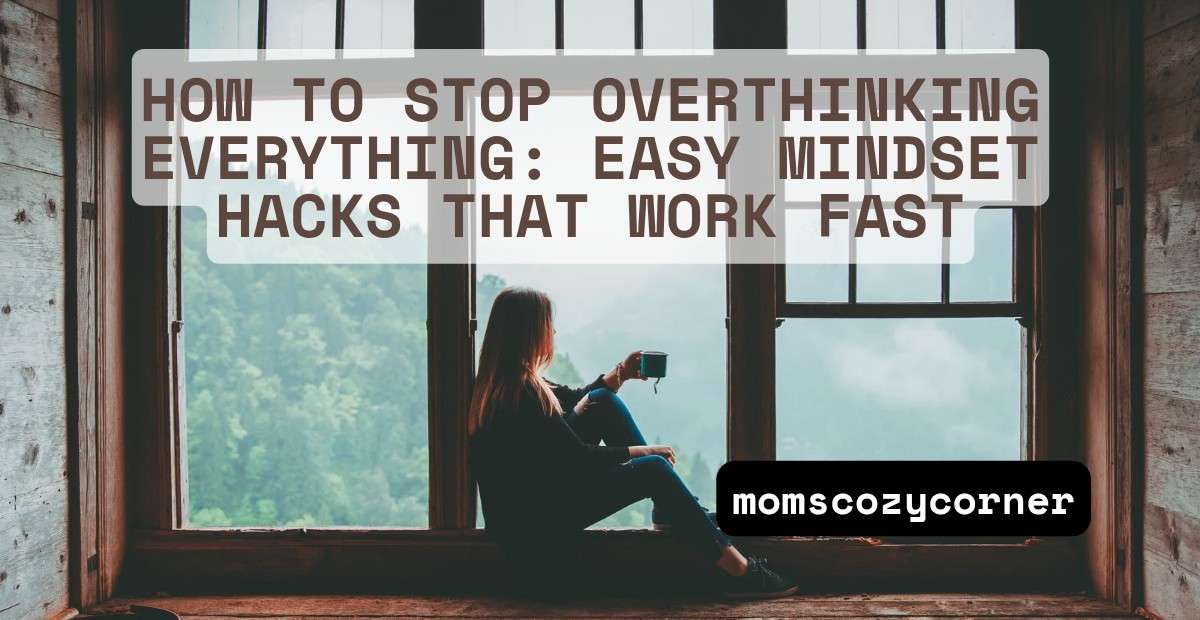Why Am I So Mean to Everyone I Love? And What I Do Differently Now
Introduction
Right now, I’m lying in bed with a heavy heart and a tangled mind. My younger one pulled out all the freshly folded clothes I had neatly stacked yesterday. I should have stayed calm. But I didn’t. I yelled. Loudly. Harshly. My elder daughter burst into tears, hugged me, and said, “Don’t shout at my sister.” Still… I didn’t stop. I looked at my younger one—no tears, just wide, confused eyes staring at me. Not knowing what she did wrong, just feeling that something wasn’t right. That silence hurt more than any scream. Now, as I replay it all in my mind, one question keeps echoing: Why am I so mean to everyone I love the most?

The Mean Mom Moments We Rarely Talk About
These aren’t the big, dramatic outbursts you see in movies.
They’re subtle. Small. Quietly painful.
They look like
-
A sigh too loud.
-
A voice too sharp.
-
A touch that’s rushed, not warm.
“I didn’t scream, but I sighed. And she noticed. Her little face dropped—not because I scolded her, but because she felt the shift in my energy.”
“I didn’t grab her hard. But I moved her too quickly. Dressed her too fast. My hands didn’t hurt her, but they didn’t comfort her either.”
These are the mean mom moments that don’t look mean to the outside world.
But they feel mean. To us. To them.
-
The spilled juice.
-
The shoes are lying around.
-
The fifth reminder to brush teeth.
And suddenly, your voice snaps. Your warmth fades. And you think
“I didn’t want to be this kind of mom today.”
What makes it worse? No one else sees those moments the way we do. We carry them—quietly, painfully—even after the kids have moved on.
But why do these moments happen?
That’s the real question, isn’t it?
Because deep down, we know we love our families with everything we’ve got.
So why do we act in ways that don’t reflect that love?
Let’s dig into the hidden emotional triggers that many of us moms silently carry.
*Why Have I Become So Bitter?
This one’s hard to admit.
Sometimes, the anger isn’t about the toys on the floor or the sibling fight.
It’s about all the versions of ourselves we’ve left behind.
“I was never a working mom. But I had dreams. Painting, crafts, decorating little corners of the house—they made me feel alive.”
“After becoming a mom, those joys slowly faded. Not all at once. Just… quietly disappeared while I was busy giving.”
-
No time for hobbies.
-
No space for creativity.
-
No permission to just be—without a task attached.
We carry that loss like a secret, and sometimes, it leaks out—as frustration, impatience, or a loud tone we didn’t mean.
“I’m not mad at them. I’m mourning the parts of me I miss.”
There’s grief in losing your identity—even if no one else sees it. That grief doesn’t always cry… Sometimes, it shouts.
*Decision Fatigue
From the outside, it looks like we’re just “managing” the family.
But inside, we’re drowning in mental tabs:
-
What to cook that everyone likes?
-
Which school activity to choose?
-
Is this the right bedtime?
-
Did I remember to wash the uniform?
Even tiny choices feel like giant projects.
“Back then, I gave opinions. Now, I make decisions—all day, every day.”
We carry the invisible burden of planning, preparing, and adjusting.
And when someone asks, “What’s for dinner?”—we ”lose it. Not because of the question… but because our minds are tired.
“I’m not overwhelmed by their needs—I’m overwhelmed by how much thinking their needs require.”
This constant mental labor feels like juggling invisible weights. And the more we carry, the closer we get to dropping it all in one sudden emotional crash.
*Touch Overload
Before marriage, our physical space was respected.
Even our parents paused before hugging us tight.
Now? It’s constant touch. Nonstop closeness.
“A toddler on your hip while you stir. A baby clinging while feeding. A preschooler jumping on your back while you bend to pick something up.”
Even the sweetest hugs, when they never stop, become too much.
And when your body hasn’t had space to breathe, even love starts to feel like pressure.
“It’s not that I don’t want affection. I just want a moment where no one is on me.”
Add in the chaos of toys underfoot, noisy cries, constant taps on your shoulder…
One moment”—boom—you yell. Not out of hate. But out of pure sensory overload.
It’s like your skin can’t take one more tiny touch. And that’s when you react—not from anger, but from complete overload.
*Emotional Starvation
We don’t just do things for our family—we love while doing them.
That’s what makes mothering beautiful—and exhausting.
“I add a spoon of love while packing lunch. Another is when I iron uniforms. Another is when I comfort my husband after a long day.”
Every act? A spoonful of emotional energy.
But no one refills our cup.
“One day I realized—I’ve been pouring into everyone else, but no one’s pouring into me.”
And if you’re ready to shift from resentment to reconnection, this might help: How Can I Be a Better Partner? Real Tips That Helped Me.
And that emptiness becomes dangerous. Because when the heart runs dry, even a tiny inconvenience feels like a landslide.
“I’m not mad at them. I’m just empty. I’ve loved so much… There’s nothing left for myself.”
And if you’re also feeling emotionally distant from your partner while holding everything together, this post might help: Why Do I Feel So Disconnected from My Partner? I Just Want Us Back.
We crave a kind word, a moment of peace, and a hot coffee that stays hot. When none of that comes, the tiredness inside us doesn’t show up as tears—it explodes as yelling.

What We Really Mean When We’re Mean
Let’s be honest—we’ve all snapped, scolded, or sighed too hard.
And then the guilt eats us alive.
But here’s something no one tells us enough: Being mean doesn’t mean we lack love.
It often means we’ve got too much love—and too little space for it.
A Moment That Hit Me Deeply…
At the mall, I saw two kids waiting on a bench—a girl around 8 and her toddler brother. Their mom returned briefly, gave snacks, and left again.
The boy, curious and carefree, ran to the escalator and squealed with joy.
His mom came running, saw him, and scolded him immediately. His face crumbled.
But then… she hugged him tight.
She wasn’t mad. She was scared. That yell was love… in a panic mask.
“That moment didn’t define her. Her hug did.”
And that’s the truth for us too.
Love can look messy. Loud. Harsh even. But underneath the surface, it’s still love—just tangled up with fear, stress, and exhaustion.
And if your arguments with your partner have been louder or more frequent lately, you’re not alone—and you’re not broken. This might offer some clarity: Is It Normal to Fight in a Relationship? Read This Before You Worry
Small Steps I’m Taking to Stay Calm
Staying calm in the chaos of motherhood isn’t easy. But these small shifts have helped me—maybe they’ll help you too:
*Journaling My Day—Raw and Real
I started writing down the hard parts of my day.
-
“When do I lose it most?”
-
“What triggers me without fail?”
Once I spotted the patterns, I was more prepared the next time.
Journaling gave my feelings a safe space—and helped me process what I couldn’t always say out loud.
*Replaying Scenarios in My Mind
After I snap, I mentally hit replay.
“If this happens again, how can I respond differently?”
Even imagining a calmer response builds a new reflex over time. It’s like emotional muscle memory—the more you rehearse peace, the more naturally it comes.
*Tracking My Progress
When I react better to the same situation that broke me last month—that’s progress.
Quiet. Personal. But powerful.
“Last time she spilled juice, I yelled. This time, I just breathed. That counts, Mama.”
*Apologizing in Front of My Kids
If I yell at my husband or lose my cool?
I try to say
“I’m sorry. That wasn’t fair of me.”
They learn more from our apologies than our lectures.
Saying sorry doesn’t make you weak. It makes you trustworthy.
*Modeling What I Want Them to Learn
Our kids are learning emotional regulation by watching us.
Every time I pause instead of yell, own my mistake, or restart the day after a meltdown, I’m teaching them resilience and compassion.
And when I mess up? I remind them (and myself):
“Even moms are learning too.”
And if you’re ready to shift from yelling to leading with calm, grace, and self-awareness, here’s something that really helped me: How to Be a Better Parent Without Yelling: Leading by Example
Final Thoughts—From One Mom’s Heart to Another
If you found this post, chances are you’re feeling overwhelmed, guilty, or maybe just really tired of yelling at the people you love.
And if your meanness sometimes hides a much deeper grief—the ache of feeling unloved or invisible in your marriage—you may want to read this too: Hurting in Silence? How to Accept Your Husband Doesn’t Love You.
Let me remind you gently: You are not a mean person.
You’re a kind person under pressure. A loving person on low energy. A wonderful mom navigating a lot.
Guilt doesn’t bring healing—reflection does.
If the same fights or meltdowns keep repeating, they’re clues.
Look at them closely. They’re trying to tell you where you’re hurting.
And remember: you’re not alone.
You’re growing. Yah, you’re healing. You’re trying—and that matters more than perfection ever will.
If any part of this touched you, or if you just want to share your own messy moment, drop it in the comments. Your words could be the hug another mama needs today.
We’re in this together. Always.
When You’re Tired of Being the Mean Mom
It’s just a quick one-pager for those “ugh, I didn’t mean to yell” kinds of days. A little checklist to help us hit reset when mom life gets too loud.
Frequently Asked Questions
1. Is my anger normal or a problem?
Getting angry at your kids, partner, or loved ones is normal—and so is feeling guilty afterward. What really matters is how often it happens and what triggers it. If it’s constant or over small things, that’s a sign to pause and self-analyze. Focus less on being perfect and more on progress—handling the next situation a little better than the last one is what truly counts.
2. Why do I get annoyed so easily with my family?
Because home is our safe place. Just like kids behave differently outside but show their true selves at home, we adults do the same. Around our loved ones, we don’t fear judgment—we let our guard down. So when stress peaks, it often bursts out on the people closest to us. It doesn’t mean we don’t love them—it means they’re the ones we feel safest with.




